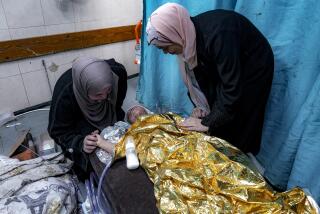The Orphaned Children of Liberia : Unresolved civil war leaves troubled African nation with haunting problem
- Share via
Many children in Liberia have no parents. They are orphans of war. At least 10,000 “unaccompanied” youngsters survive in Liberia, according to the International Red Cross. These children--like Kurdish children and Bangladeshi children--represent a great and urgent appeal to the international conscience.
Tens of thousands of people died during the civil war that led last year to the slaying of the brutal and oppressive President Samuel Doe. The intense fighting drove as many as 1 million people--nearly half the population--into miserable refugee camps in Sierra Leone, the Ivory Coast and Guinea. The Liberians who stayed faced shortages in water, food, health care and other essentials. But the most heart-wrenching domestic problem is orphaned children.
The 16-member Economic Community of West African States sent in troops to stop the fighting. That initiative represented a welcome African solution to an African problem. It stopped the shooting but did not force unity. The organization tried again Monday to negotiate elections but got nowhere with rival factions.
There are two Liberias. An interim president, Amos Sawyer, governs in Monrovia. Charles Taylor, the rebel leader who led the first charge against Doe, controls the rest of the nation. Taylor is a major problem; he refuses to agree to elections, and his domination frightens refugees, many of whom refuse to return home.
Some help awaits them. Many governments are providing food and technical assistance. Swedish workers are repairing hospitals. Japanese technicians are rebuilding turbines. Nigerian engineers are restoring radio communications.
The usual humanitarians--the United Nations, UNICEF, the French-based Medicins Sans Frontieres, the International Red Cross and Britain’s Save the Children--work to stave off starvation and heal the scars of war. But real reconstruction--the rebuilding of families, the economy, the infrastructure and the government--will require more substantial assistance.
The United States is providing food, but many in Liberia--founded by freed American slaves--expect greater generosity. That optimism may be unrealistic because of competition for foreign aid and demands for greater attention to domestic problems in the United States. Still, rebuilding Liberia will take reunion, reconstruction, reconciliation--and massive international goodwill.
More to Read
Sign up for Essential California
The most important California stories and recommendations in your inbox every morning.
You may occasionally receive promotional content from the Los Angeles Times.













